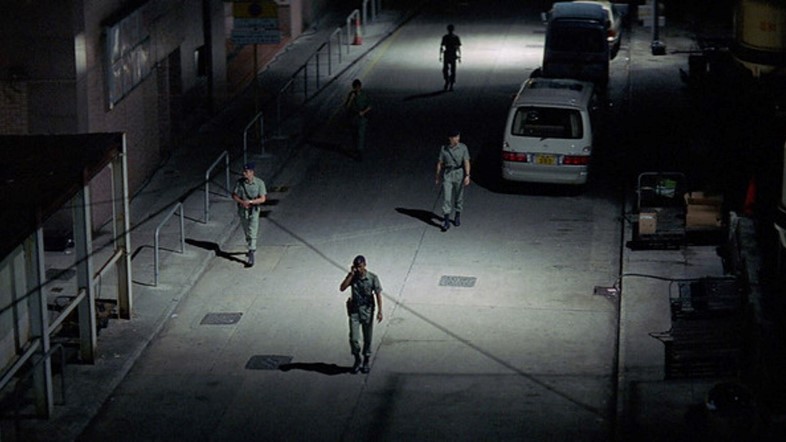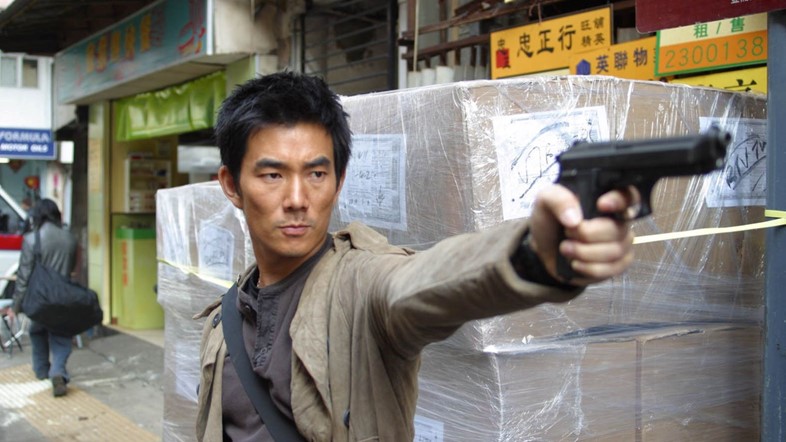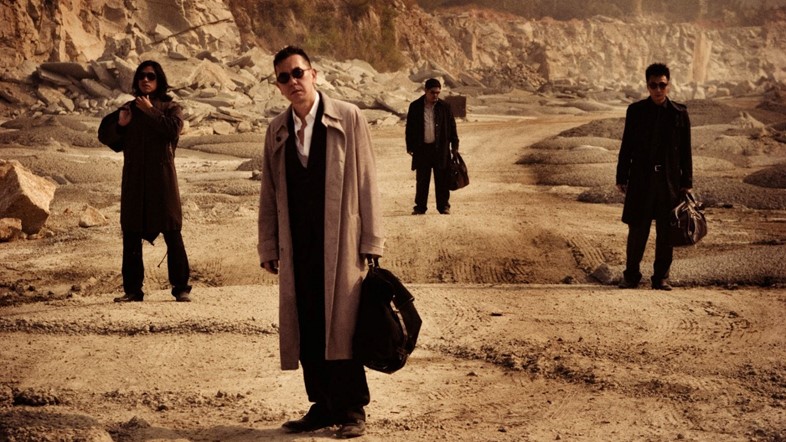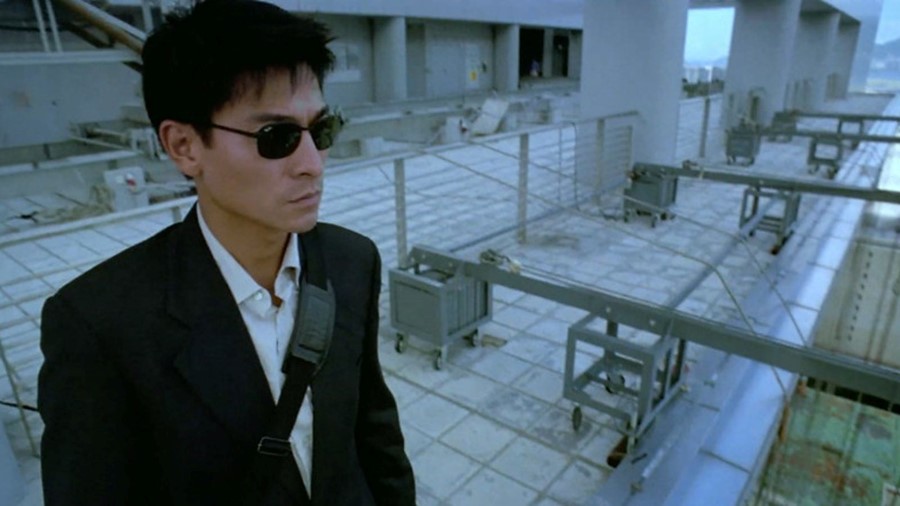Through gangster epics and tense heist dramas, Johnnie To makes stylish and atmospheric cinema that courts mainstream appeal as often as it subverts it
It’s true that the 1980s is still regarded as the golden age of Hong Kong cinema – thanks in part to a shining studio system that consistently churned out dynamic, globally-renowned action films. But the island nation undoubtedly continued delivering riveting and stylish works well into the Handover era (circa 1997) and beyond.
Wong Kar-wai set the world alight through much of the 1990s via French New Wave and MTV-inspired works like Chungking Express and In The Mood For Love; the director experienced a revival last year thanks to a major restoration of his films, which introduced them to a new generation around the world. Now, in 2022, another major Hong Kong director of the post-golden-age era gets his moment in the sun. Prolific crime auteur Johnnie To sees his films re-released by distributors like Eureka and Chameleon Films this July, while the UK-China Film Collab brings three works to the Prince Charles Cinema in London the same month.
Less a mere filmmaker than an institution in himself, To established the production Milkyway Image alongside collaborator and screenwriter Wai Ka-fai in the mid-90s as the wider industry fell into decline in the lead up to the Handover of 1997. The production house remains the predominant vessel for his work – and by retaining considerable creative control over his productions, To has been able to craft his own niche in commercial Hong Kong cinema that harks back to the action-orientated 80s, while also departing into more intricate, sophisticated and even darker territory.
Through gangster epics, tense heist dramas and cops vs. robbers movies, To maintains a fascination with fraternities (be they gangs or police squads) and the brothers-in-arms philosophies that govern them. Further compounding his films’ recognisability is a rotating cast of recognisable actors – ranging from menacing character actors to major Hong Kong stars. The result is a stylish and atmospheric cinema that courts mainstream appeal as often as it subverts it. To’s films often win big at the box office, and pick up major awards in Hong Kong and overseas; six of his films have played at Cannes (where he’s also served on the jury), four at Venice, and one at Berlin. An extremely prolific creator with over 65 directorial credits to his name, it can be difficult to work out where to start with To – here’s a few ideas:
The Mission (1999)
Over a decade prior to The Mission, Hong Kong action filmmaking was redefined by directors like John Woo (Hard Boiled) and Ringo Lam (City on Fire) – who traded kung fu and fantasy for gangsters, guns and blood. The “heroic bloodshed” genre, as it became known, was to become a global enterprise thereafter – with Woo and Lam snapped up by Hollywood in the mid-90s to direct films like Face/Off and Mission: Impossible 2.
But The Mission – a pivotal entry in To’s storied career that was shot and edited in a single month – threw the rulebook out once again, replacing explosive action and bullet sequences for stylish minimalism and tension. These vivid qualities would become hallmarks of his crime oeuvre thereafter.
Gangsters remain the focus – with To’s core cast of Anthony Wong, Simon Yam and Lam Suet assembling here for the first time alongside the brilliant Francis Ng (Drifting), who play a group of bodyguards tasked with protecting a triad boss after an unsuccessful assassination attempt. With limited dialogue, physical performances instead form each character’s personality, as nervy stand-offs in alleys and shopping malls provide a series of suspenseful set pieces.
Running Out of Time (1999)
The latest To film to receive Eureka’s ‘Masters of Cinema’ treatment was a major box office success for the director in 1999 – the same year that he released The Mission. The film opens with a vertigo-inducing POV shot where Hong Kong superstar Andy Lau (Infernal Affairs) peers down the side of a glimmering skyscraper. Before long, a violent hostage situation is underway: he’s a jewel thief diagnosed with a terminal illness, and with just weeks to live he’s decided he wants to “play a game” with a maverick police negotiator (the magnetic Sean Lau).
A nail-biting battle of wits that recalls 80s and 90s Hollywood classics like Speed and even Die Hard ensues. “It’s lunatic meets lunatic!” comments one bystander – a great compliment to the film’s delirious thrills.

PTU (2003)
This moody nightscape – explored in greater depth here – follows a cop around the largely deserted streets of the island metropolis in search of his missing gun, in a plot that riffs on the classic Akira Kurosawa noir Stray Dog.
The film caused a buzz upon its 2003 – and even received a cinema release in the UK, further consolidating To’s reputation in the West as a bastion of Y2K Hong Kong crime cinema. It would miss out on the Best Picture prize at the Hong Kong Film Awards in 2004 to Running On Karma – another To film. The latter screens at the Prince Charles cinema in London in July.
Breaking News (2004)
To goes full Heat in this emphatic heist flick, about a failed robbery that results in a city-wide standoff – involving hostages, SWAT teams and brilliantly choreographed set pieces that make remarkable use of Hong Kong’s lofty architecture. Most impressive is the film’s exhilarating opening sequence: a seven-minute long take filmed using a crane camera that captures the fallout while car sirens and gunfire provide the soundtrack. Tension is compounded by the fact that the police are in the middle of a humiliating PR crisis – which is tackled head-on by a strong female protagonist in Kelly Chen.
Australian distributors Chameleon Films reissue the film on Blu-ray in July, but it’s a spectacle made for the big screen: Londoners can catch it at the Prince Charles Cinema on July 14.

Election and Election 2 (2005 and 2006)
To’s two-part, Category III-rated gangster epic is often compared to The Godfather – and rightly so. It is, to Hong Kong, what any of Coppola or Scorsese’s gangster classics are to the West. Via a whirlwind of betrayed alliances, raided hideouts and foiled deals, the duology follows an ensemble of crime lords and cronies as they manoeuvre against their opponents ahead of a Chinese triad’s chairman election. And while the tense atmosphere is occasionally punctuated by scenes of gruesome violence, the brilliantly-orchestrated action is never superfluous to the intricate plotting.
Amidst a star-studded cast of To regulars, the emphatic Tony Leung Ka-fai picked up a Hong Kong Film Award for his explosive turn as an unhinged hothead in part one – but that’s not the only recognition that these films received upon release. Both instalments premiered at Cannes (in 2005 and 2006, respectively), and were later named the best films of their respective years by the Hong Kong Film Critics’ Society.
Exiled (2006)
Exiled missed out on the prestigious Golden Lion at Venice in 2006 to Jia Zhangke’s Still Life, but it remains an abstract highlight of To’s ever-stylish crime canon. The film, which reunites the core cast members of The Mission in similar roles, is light on plot and heavy on atmosphere. Shades and smoking guns are the meat and bones here, as a group of hitmen in Macau decide they don’t want to carry out the hit, while the mob who ordered it bears down. It’s the deep evocation of classic spaghetti westerns, though, that makes Exiled feel fresh.
Dynamic shoot-outs take place in apartment blocks that look like saloons; at one point, the hired guns even end up in a dustbowl beneath scorched orange skies, in a scene that recalls Once Upon a Time in the West. Most evocative are the earthy guitar drones and harmonicas that line the soundtrack throughout. A newly-restored version launches on Australian distribution label Chameleon Films this month.

Vengeance (2009)
The brooding finale of To’s informal “vengeance trilogy” (comprising The Mission, Exiled and Vengeance) opens dramatically, as the family of a French woman is brutally murdered during a home invasion. Her father, a restauranteur with a shady past, arrives in the gambling mecca of Macau seeking justice – and hires a trio of assassins to aid him on his quest.
The vengeful Francis Costello is played by a superstar, Johnny Hallyday – the man responsible for bringing rock and roll to France in the 1960s, who once performed to over a million people at a concert held at the Eiffel Tower. Often compared to Elvis in his prime, Hallyday is brilliantly sleek and serpent-like here in the role of a muted ex-villain who strolls the neon-lit red-light district in trenchcoat and fedora.
To regulars Anthony Wong, Lam Suet and Simon Yam are no less stern in their roles as supporting hitmen and crime lords, respectively. Like Exiled, droning guitars offer a western flavour to this shadowy and noir-tinged feature, and there are claustrophobic shootouts aplenty to punctuate the moody silences. The resulting work – nominated for the Palme d’Or at Cannes – at times evokes the minimalist noir of French icon Jean-Pierre Melville, as is hinted by the name of the lead character (pinched from Melville’s Le Samourai).
Life Without Principle (2011)
Sean Lau (Running Out of Time) and Cantopop star and activist Denise Ho impress in this slow-burning triptych concerning a bank employee, a cop and a low-level gangster – which screens at the Prince Charles cinema in London this month.
The plot, which interweaves stories in a manner not unlike Pulp Fiction, concerns the fallout of the global recession of the late 2000s – with a Hong Kong bank acting as a central setting. Money is everywhere in this riveting tale of risk and opportunity, with images of cash-counting machines, crumpled bills and stock figures a constant and stressful reminder of the high stakes involved.
The end result, which screened in competition at Venice before being submitted for Academy Awards consideration, recalls a latter-day Oscars’ Best Picture nominee that adapts the same subject matter: The Big Short. Tweaky gangster Panther (Lau), meanwhile, brings a touch of Uncut Gems’ chaos to the mix – and the actor deservingly took home a Golden Horse award in Hong Kong for his twitchy, unpredictable performance.
